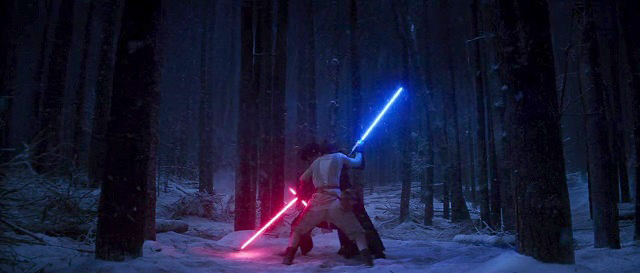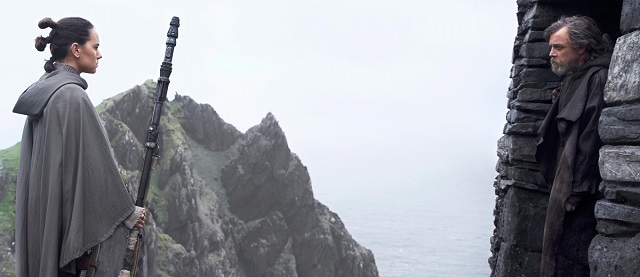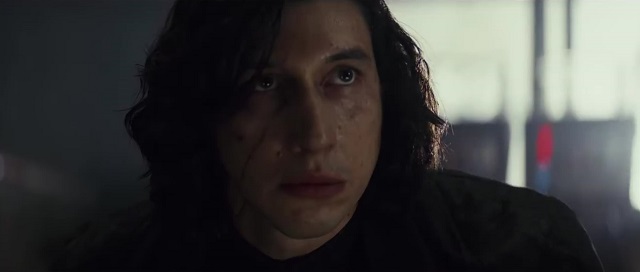
One of the most prominent themes in The Last Jedi is the contrast between the haves and the have-nots. A dichotomy present not only within the city of Canto Bight or in organizations like the First Order and the Resistance, but also between characters.
Emblematic of this idea are Rey and Kylo Ren. Indeed, never in the Star Wars franchise have we seen such a clear distinction between one character who has nothing and everything and another who has everything and nothing.
“Kylo failed you. I won’t.”
This contrast is particularly evident with regard to the theme of betrayal. Whether it is Rey’s parents abandoning her or Luke igniting his lightsaber that night in Ben’s hut, the journeys of both hero and villain begin with an act of familial betrayal. Yet while Kylo answers like with like—one dark side trait (fear) with others (anger, aggression)—Rey’s reaction is markedly different.
In the throne room scene, she has the chance to abandon the Resistance as her parents did to her. Yet even as she reels from both this painful acknowledgement and the recognition that her waiting and harsh upbringing on Jakku were for nothing, Rey refuses.
To have suffered an act of familial betrayal far worse than Ben’s and yet choose to be better than what came before demonstrates that Rey has a strength Kylo could never have. Without even moving, she provides the film with one of its most inspiring, heroic moments. Arguably in the same vein as Luke’s actions on Crait.
“The Scavenger.”
That appellation applies far more to Kylo than to Rey. He has shown himself to be a narrative scavenger, taking what he likes from old things—old stories—and leaving what he doesn’t, most clearly seen in his treatment of the story of Darth Vader. Kylo takes what he likes (the look) and leaves what he doesn’t (Anakin, the tragedy). Iconography over biography.
The contrast with our protagonist is striking. By the end of the film, she is in possession of the sacred Jedi texts, a literal representation of old stories. But rather than slavishly rehash the past as Kylo does, she takes the good with the bad: both Luke’s heroism and his failures. She and a whole new generation, untouched by what’s come before, are free to interpret those texts—those stories— in a whole new way.
Kylo scavenges. Rey creates.

“I thought he was a myth.”
Both hero and villain have to deal with their favored myths failing them. In Kylo’s case, this is shown by the smashing of his helmet, perhaps a way of putting an end to his attempt at emulating Vader. Despite his best efforts, all it has given him are more conflicted feelings and belittling remarks from Snoke.
But Rey also lashes out. We see her anger at even the implication that what Kylo told her regarding Luke’s actions is true. That he could be anything less than the infallible icon she had in her head. That legends are people too. However, while she learns to let go of the quixotic myth of “Luke Skywalker: Jedi Master”, what she retains is just as important.
“You underestimate Skywalker.” Her words to Snoke convey the idea that while she no longer idolizes Luke, she continues to respect him. A far cry from Kylo’s histrionics; Rey has gained a more mature, comprehensive view of those she mythologized while he has not.
“I’ve never felt so alone.”
From Kylo’s reaction to being derided by Snoke to Rey’s hurt over the situation with Luke, both characters are in emotional turmoil when people can’t be who they want them to be. Here however, is where we clearly see our hero has something our villain hasn’t: emotional maturity.
Kylo can’t be what Rey wants him to be (a redemptive figure). But by then she has grown as a character so instead of being hurt as she was earlier, she accepts it. In their last scene together, her expression is one of disappointment rather than hurt.
Yet Kylo’s emotional turmoil continues unabated. He lurches from violence—“I’ll destroy her. And you. And all of it”—to hurt when Rey closes the literal and figurative door on him.

“I’ve given everything I have to you. To the Dark Side.”
Initially, both hero and villain attempt to gain a sense of identity through a single character (Luke and Snoke, respectively), ideology, or title. Yet while that may be true for our protagonist in the beginning, it certainly isn’t at the end. Indeed, The Last Jedi is very much a story of hero and villain forging and losing their respective identities through their own actions. This brobdingnagian change is conveyed through the most innocuous of phrases:
“I’m Rey.”
The last time our hero spoke those words, aboard the Millennium Falcon, she was still waiting for others (her parents) to give her a sense of belonging and tell her who she was and her sense of identity was very much informed by a title given to her, “I’m just a scavenger”. When the words are repeated in TLJ, it is by a character who has grown beyond that to gain a new sense of identity and belonging—not through lineage, title or someone telling her who she is, but through her actions and interactions with those around her. Finn, a friend; Leia, a mentee; the Resistance members, a hero. She is who she and the people in her life have made her.
“You’re nothing.”
Conversely, Kylo may have let go of the past but not of that concept of basing all he is on a single thing. He demands Rey let go of everyone else in her life. They will have nothing in their lives but each other. Her refusal, coupled with his murder of Snoke and rejection of the idea of Vader, leaves Kylo with nothing in terms of an identity. Thus we see him immediately seek a new one through a title: “The Supreme Leader is dead!”
The past may be dead but since his identity was nothing but past stories (fallen Jedi, enforcer of an authoritarian regime, emulating Vader), who is he without it?
“We have everything we need.”
By the end of the film, Rey has turned down galactic leadership, and is in possession of a few old books and a freighter full of retreating Resistance members. Kylo Ren is now Supreme Leader of an ascendant First Order. Yet the film makes it clear that it is she who is the truly ascendant one.
In their last scene together, Rey has walked up the Falcon’s boarding ramp, moving forward in every sense. Kylo meanwhile, is in one place, physically and emotionally, and is unable to go back to the old stories that defined him. For a character who spoke of the importance of one’s story he is reduced to having nothing. Not even his own story.
